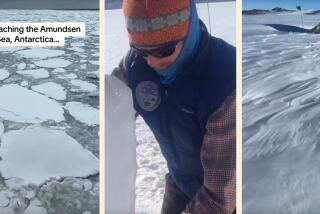Critics’ review unexpectedly supports scientific consensus on global warming
- Share via
A team of UC Berkeley physicists and statisticians that set out to challenge the scientific consensus on global warming is finding that its data-crunching effort is producing results nearly identical to those underlying the prevailing view.
The Berkeley Earth Surface Temperature project was launched by physics professor Richard Muller, a longtime critic of government-led climate studies, to address what he called “the legitimate concerns” of skeptics who believe that global warming is exaggerated.
But Muller unexpectedly told a congressional hearing last week that the work of the three principal groups that have analyzed the temperature trends underlying climate science is “excellent.... We see a global warming trend that is very similar to that previously reported by the other groups.”
The hearing was called by GOP leaders of the House Science & Technology committee, who have expressed doubts about the integrity of climate science. It was one of several inquiries in recent weeks as the Environmental Protection Agency’s efforts to curb planet-heating emissions from industrial plants and motor vehicles have come under strenuous attack in Congress.
Muller said his group was surprised by its findings, but he cautioned that the initial assessment is based on only 2% of the 1.6 billion measurements that will eventually be examined.
The Berkeley project’s biggest private backer, at $150,000, is the Charles G. Koch Charitable Foundation. Oil billionaires Charles and David Koch are the nation’s most prominent funders of efforts to prevent curbs on the burning of fossil fuels, the largest contributor to planet-warming greenhouse gases.
The $620,000 project is also partly funded by the federal Lawrence Berkeley National Laboratory, where Muller is a senior scientist. Muller said the Koch foundation and other contributors will have no influence over the results, which he plans to submit to peer-reviewed scientific journals.
Ken Caldeira, an atmospheric scientist at the Carnegie Institution for Science, which contributed some funding to the Berkeley effort, said Muller’s statement to Congress was “honorable” in recognizing that “previous temperature reconstructions basically got it right…. Willingness to revise views in the face of empirical data is the hallmark of the good scientific process.”
But conservative critics who had expected Muller’s group to demonstrate a bias among climate scientists reacted with disappointment.
Anthony Watts, a former TV weatherman who runs the skeptic blog WattsUpWithThat.com, wrote that the Berkeley group is releasing results that are not “fully working and debugged yet.... But, post normal science political theater is like that.”
Over the years, Muller has praised Watts’ efforts to show that weather station data in official studies are untrustworthy because of the urban heat island effect, which boosts temperature readings in areas that have been encroached on by cities and suburbs.
But leading climatologists said the previous studies accounted for the effect, and the Berkeley analysis is confirming that, Muller acknowledged. “Did such poor station quality exaggerate the estimates of global warming?” he asked in his written testimony. “We’ve studied this issue, and our preliminary answer is no.”
Temperature data are gathered from tens of thousands of weather stations around the globe, many of which have incomplete records. Over the last two decades, three independent groups have used different combinations of stations and varying statistical methods and yet arrived at nearly identical conclusions: The planet’s surface, on average, has warmed about 0.75 degrees centigrade (1.4 degrees Fahrenheit) since the beginning of the 20th century.
Temperature data were the focus of the so-called 2009 Climategate controversy, in which opponents of greenhouse gas regulation alleged that leaked emails from a British climate laboratory showed manipulation of weather station records. Five U.S. and British government and university investigations have refuted the charges.
“For those who wish to discredit the science, this [temperature] record is the holy grail,” said Peter Thorne, a leading expert at the National Oceanic and Atmospheric Administration’s National Climatic Data Center in Asheville, N.C. “They figure if they can discredit this, then society would have significant doubts about all of climate science.”
Thorne said scientists who contributed to the three main studies — by NOAA, NASA and Britain’s Met Office — welcome new peer-reviewed research. But he said the Berkeley team had been “seriously compromised” by publicizing its work before publishing any vetted papers.
On the project’s website, in a public lecture and in statements to the media, Muller had portrayed the Berkeley effort as rectifying the “biases” of previous studies, a task he compared with “Hercules cleaning out the Augean stables.” He said his study would be “more precise,” analyzing data from 39,000 stations — more than any other study — and offering “transparent,” rather than “homogenized” data.
Kevin Trenberth, who heads the Climate Analysis Section of the National Center for Atmospheric Research, a university consortium, said he was “highly skeptical of the hype and claims” surrounding the Berkeley effort. “The team has some good people,” he said, “but not the expertise required in certain areas, and purely statistical approaches are naive.”
The project team includes UC Berkeley statistician David Brillinger and UC Berkeley physicists Don Groom, Robert Jacobsen, Saul Perlmutter, Arthur Rosenfeld and Jonathan Wurtele. The group’s atmospheric scientist is Judith Curry, chairwoman of the School of Earth and Atmospheric Science at Georgia Tech, who has suggested that temperature data were “airbrushed” by other scientists.
One full-time staffer, Richard Rohde, a who recently earned a doctorate in statistics, is doing most of the work, Muller said.
Although in his testimony Muller praised the “integrity” of previous studies, he said estimates of human-caused warming need to be “improved.” And despite his preliminary praise for earlier studies, he said further data-crunching “could bring our current agreement into disagreement.”
Other scientists noted that temperature is only one factor in climate change. “Even if the thermometer had never been invented, the evidence is there from deep ocean changes, from receding glaciers, from rising sea levels and receding sea ice and spring snow cover,” Thorne said.
“All the physical indicators are consistent with a warming world. There is no doubt the trend of temperature is upwards since the early 20th century. And that trend is accelerating.”







